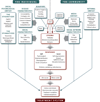The Stigma Complex
- PMID: 26855471
- PMCID: PMC4737963
- DOI: 10.1146/annurev-soc-071312-145702
The Stigma Complex
Abstract
Since the beginning of the twenty-first century, research on stigma has continued. Building on conceptual and empirical work, the recent period clarifies new types of stigmas, expansion of measures, identification of new directions, and increasingly complex levels. Standard beliefs have been challenged, the relationship between stigma research and public debates reconsidered, and new scientific foundations for policy and programs suggested. We begin with a summary of the most recent Annual Review articles on stigma, which reminded sociologists of conceptual tools, informed them of developments from academic neighbors, and claimed findings from the early period of "resurgence." Continued (even accelerated) progress has also revealed a central problem. Terms and measures are often used interchangeably, leading to confusion and decreasing accumulated knowledge. Drawing from this work but focusing on the past 14 years of stigma research (including mental illness, sexual orientation, HIV/AIDS, and race/ethnicity), we provide a theoretical architecture of concepts (e.g., prejudice, experienced/received discrimination), drawn together through a stigma process (i.e., stigmatization), based on four theoretical premises. Many characteristics of the mark (e.g., discredited, concealable) and variants (i.e., stigma types and targets) become the focus of increasingly specific and multidimensional definitions. Drawing from complex and systems science, we propose a stigma complex, a system of interrelated, heterogeneous parts bringing together insights across disciplines to provide a more realistic and complicated sense of the challenge facing research and change efforts. The Framework Integrating Normative Influences on Stigma (FINIS) offers a multilevel approach that can be tailored to stigmatized statuses. Finally, we outline challenges for the next phase of stigma research, with the goal of continuing scientific activity that enhances our understanding of stigma and builds the scientific foundation for efforts to reduce intolerance.
Keywords: connectedness; discrimination; disparities; mental illness; prejudice; race/ethnicity; sexual orientation.
Figures


Similar articles
-
Rethinking theoretical approaches to stigma: a Framework Integrating Normative Influences on Stigma (FINIS).Soc Sci Med. 2008 Aug;67(3):431-40. doi: 10.1016/j.socscimed.2008.03.018. Epub 2008 Apr 22. Soc Sci Med. 2008. PMID: 18436358 Free PMC article.
-
The Health Stigma and Discrimination Framework: a global, crosscutting framework to inform research, intervention development, and policy on health-related stigmas.BMC Med. 2019 Feb 15;17(1):31. doi: 10.1186/s12916-019-1271-3. BMC Med. 2019. PMID: 30764826 Free PMC article.
-
Visible and Concealable Stigmatized Identities and Mental Health: Experiences of Racial Discrimination and Anticipated Stigma.Stigma Health. 2020 Nov;5(4):488-491. doi: 10.1037/sah0000210. Epub 2019 Dec 12. Stigma Health. 2020. PMID: 34027061 Free PMC article.
-
Measuring mental illness stigma.Schizophr Bull. 2004;30(3):511-41. doi: 10.1093/oxfordjournals.schbul.a007098. Schizophr Bull. 2004. PMID: 15631243 Review.
-
Stigma in an Aging Context.Interdiscip Top Gerontol Geriatr. 2017;42:144-158. doi: 10.1159/000448560. Epub 2016 Nov 22. Interdiscip Top Gerontol Geriatr. 2017. PMID: 27875830 Review.
Cited by
-
Understanding mental health stigma and discrimination in Ethiopia: A qualitative study.Glob Ment Health (Camb). 2024 Apr 30;11:e58. doi: 10.1017/gmh.2024.55. eCollection 2024. Glob Ment Health (Camb). 2024. PMID: 39220107 Free PMC article.
-
A Serious Game for Young People With First Episode Psychosis (OnTrack>The Game): Qualitative Findings of a Randomized Controlled Trial.JMIR Ment Health. 2022 Apr 6;9(4):e33526. doi: 10.2196/33526. JMIR Ment Health. 2022. PMID: 35384847 Free PMC article.
-
The magnitude and correlates of internalized stigma among people with mental illness attending the outpatient department of Amanuel Mental Specialized Hospital, Addis Ababa, Ethiopia.Heliyon. 2022 May 14;8(5):e09431. doi: 10.1016/j.heliyon.2022.e09431. eCollection 2022 May. Heliyon. 2022. PMID: 35607501 Free PMC article.
-
Reducing stigma impacting children and adolescents in low- and middle-income countries: The development of a common multi-component stigma reduction intervention.PLoS One. 2023 Oct 31;18(10):e0292064. doi: 10.1371/journal.pone.0292064. eCollection 2023. PLoS One. 2023. PMID: 37906579 Free PMC article.
-
Experiences of healthcare and substance use treatment provider-based stigma among patients receiving methadone.Drug Alcohol Depend Rep. 2023 Feb 7;6:100138. doi: 10.1016/j.dadr.2023.100138. eCollection 2023 Mar. Drug Alcohol Depend Rep. 2023. PMID: 36994374 Free PMC article.
References
-
- Abadía-Barrero CE, Castro A. Experiences of stigma and access to HAART in children and adolescents living with HIV/AIDS in Brazil. Soc. Sci. Med. 2006;62:1219–1228. - PubMed
-
- Alvidrez J, Snowden LR, Kaiser DM. The experience of stigma among Black mental health consumers. J. Health Care Poor Underserved. 2008;19:874–893. - PubMed
-
- Anderson M, Elam G, Gerver S, Solarin I. HIV/AIDS-related stigma and discrimination: accounts of HIV-positive Caribbean people in the United Kingdom. Soc. Sci. Med. 2008;67:790–798. - PubMed
-
- Angermeyer MC, Matschinger H. Causal beliefs and attitudes to people with schizophrenia. Br. J. Psychiatry. 2005;186:331–334. - PubMed
-
- Angermeyer MC, Schulze B, Dietrich S. Courtesy stigma: a focus group study of relatives of schizophrenia patients. Soc. Psychiatry Psychiatr. Epidemiol. 2003;38:593–602. - PubMed
Grants and funding
LinkOut - more resources
Full Text Sources
Other Literature Sources
Medical
Miscellaneous
